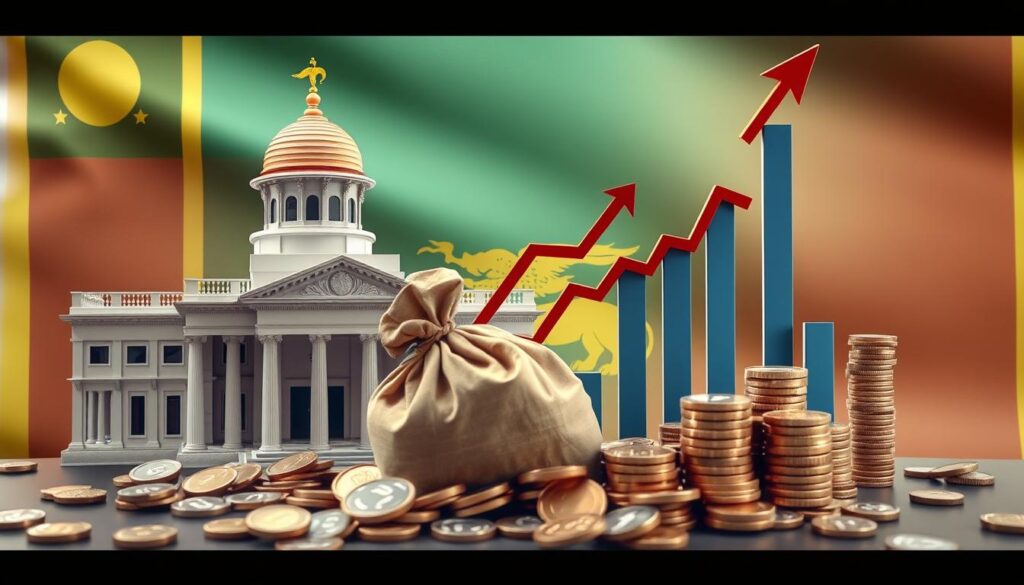Tax Hikes: Government’s Plan to Address Fiscal Deficit
Sri Lanka’s government has revealed its fiscal strategy for 2021-2025. The plan aims to tackle the growing deficit and stabilize public finance. The Medium Term Macro Fiscal Framework sets key goals for the country.

The strategy focuses on tax increases and reforms to boost government revenue. It aims to raise the revenue-to-GDP ratio to over 14% by 2025. This will be done through tax policy changes and improved revenue administration.
The government targets 6% economic growth and low unemployment. It also wants to keep inflation under 5%. Public investment will focus on vital infrastructure projects like roads and water supply.
Despite COVID-19 challenges, the government is committed to its fiscal strategy. The plan seeks to address the deficit and promote sustainable growth for Sri Lanka.
Government’s Fiscal Strategy for 2021-2025
Sri Lanka’s government has outlined its fiscal strategy for 2021-2025 in the Medium Term Macro Fiscal Framework (MTMFF). Key objectives include achieving a primary surplus by 2025 and reducing the budget deficit. The plan aims to cut unproductive spending and create a sustainable budget.
Medium Term Macro Fiscal Framework Objectives
The MTMFF focuses on reforming state-owned enterprises to boost efficiency. Qualified professionals will be appointed to management boards to improve productivity. These changes aim to reduce the burden on the government’s budget.

Public Investment Focus and Financing
Public investment will prioritize road projects and increase access to pipe-borne water. These investments will boost productivity in agriculture and industries. They’ll also improve citizens’ quality of life.
Domestic financing will cover 75% of public investment. This approach complements private sector investments and stimulates economic activity.
Rationalizing Recurrent Expenditure
The government plans to reduce recurrent expenditure from 14.2% of GDP in 2021 to 12.3% by 2025. This strategy includes freezing spending on vehicles, buildings, and other assets.
Digitalizing key systems like e-procurement and e-National Identity Card will boost efficiency. These measures will help streamline government operations and cut costs.
Government Implements Tax Hikes to Boost Revenue Amid Fiscal Deficit
Sri Lanka’s government has launched a plan to tackle the fiscal deficit. They’re using tax policy reforms and revenue administration to increase income. These changes aim to improve tax collection and support fiscal consolidation efforts.
Comprehensive Strategy Linking Tax Policy and Revenue Administration Reforms
The government has made several tax policy changes. These include raising the PAL rate and removing the NBT rate. They’ve also simplified the tax system to make it more efficient.
These reforms are paired with improvements in revenue administration. The goal is to make tax collection more effective. These measures are expected to boost revenue and support fiscal consolidation.
Simplification of the Taxation System
The government has made the tax system simpler and more user-friendly. They’ve cut down the number of taxes people need to pay. This includes removing taxes like NBT, PAYE, and WHT.
These changes should make it easier for people to pay their taxes. The government hopes this will lead to better compliance and more revenue.
Capacity Enhancing Measures in Revenue Administration
New measures have been put in place to improve tax collection. The Inland Revenue Department now has a Large Taxpayers Unit. They’ve also introduced risk-based audits and improved their information system.
Sri Lanka Customs has launched a Single Window System. They’re also working on a National Single Window platform. These changes aim to make trade easier and improve revenue collection.
Despite the economic crisis, the government is investing in education. They’ve set aside Rs. 465 billion for education in 2024. This shows their commitment to creating a better education system for all students.
These reforms and investments are part of a larger plan. The government hopes to improve the economy and promote long-term growth.
Conclusion
Sri Lanka’s government aims to tackle its fiscal deficit and boost economic stability. They’re focusing on tax reforms and better revenue collection to increase income. Simplifying taxes and improving administration should help achieve this goal. The strong performance of the Colombo Stock shows investor faith in the economy.
Expenditure management is crucial for fiscal consolidation. The government plans to cut recurring costs while investing in key sectors. This approach should optimize resources and support growth.
COVID-19 has created significant challenges for Sri Lanka’s fiscal targets. The pandemic caused job losses and economic shrinkage. Sri Lanka’s economy shrank by 7.8 percent in 2022 and 7.9 percent in early 2023.
Despite setbacks, the government remains committed to reforms. The IMF’s approval of a US$3 billion Extended Fund Facility demonstrates this commitment. Success depends on implementing reforms and managing debt restructuring effectively.
The government must stay alert and flexible to achieve its fiscal goals. By doing so, they can work towards sustainable economic growth in the coming years.